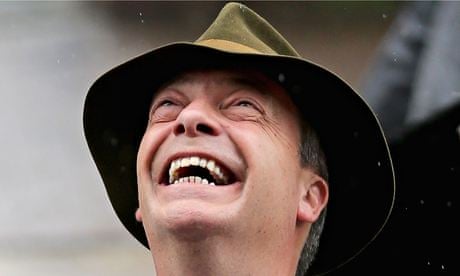Allow me to sketch you a portrait of a political leader. Even by the lax standards of the powerful, he is England's greatest living hypocrite. He courts popularity by warning that tens of millions from the dole queues of Europe are coming to take British jobs, while employing his German wife as his secretary. He denounces "the political class" for living like princes at the taxpayers' expense while pocketing every taxpayer-funded allowance he can claim for himself, his wife and his colleagues.
He says he represents "ordinary people". But he is a public school-educated former banker, whose policies will help him and his kind. He claims he is the voice of "common sense", while allying with every variety of gay-hater, conspiracy crackpot, racist, chauvinist and pillock. The only sense he and his followers have in common is a fear of anyone who is not like them.
You might expect that Britain's famously aggressive media would tear into his multiple deceits. Yet so tame has their treatment of Nigel Farage been, so indulgent and complicit, viewers were surprised when the BBC's political editor found the courage last week to raise a timorous voice and ask him why he was employing his German wife rather than giving a British job to a British worker. Broadcasters are ferocious when they tackle mainstream politicians, but are as eager to please as wet-tongued labradors when they meet Ukip. To understand why, you need to grasp how the political culture of modern democracies encourages both conformism and zealotry.
Broadcasters say they give Britain's representative of Europe's rightwing wave such prominence because Farage is good on television: a cheeky and witty guest rather than a formulaic political pro. As Hollywood doesn't cast ugly actors as romantic leads and radio producers seldom hire presenters with stammers, accusing broadcasters of double standards because they favour people who are good on television feels as absurd as accusing Brendan Rodgers of bias because he picks gifted footballers to play for Liverpool or publishers of prejudice because they commission authors who write well.
Media managers would have every right to sneer at bland "professional politicians", and promote exciting alternatives, had they not helped create the soundbite-spouting robots they are so keen to denounce. With the arrival of 24-hour news, they had to fill hours of empty schedules. Every ill-considered statement by a politician became a "gaffe"; every disagreement with the leader a "split". Ambitious politicians responded by saying nothing that might be used against them. Social media and mobile phones have accelerated their desire to march in step with the herd. Now a public figure must behave as if they are on camera whenever they are in a public space.
I am not trying to excuse our leaders. Political parties, private companies and public bureaucracies need to relax if they want a hearing in the 21st century, and stop treating the smallest deviation from the party line as an "unprofessional" affront. But it is rich of broadcasters to preach against professional politics when they were its midwives, and sinister of them to promote fanaticism as a cure for the boredom it generates.
For in the kingdom of the bland, the intolerant man is king. British and US TV have turned newspaper pundits into minor celebrities: a curious addition to the Z-list that makes little sense until you realise that the pundit is free to posture and foam and provide the gladiatorial aggression that will keep the audience from reaching for the remote. Extremist politicians such as Nigel Farage and George Galloway serve the same purpose. They don't have to worry about breaking party lines because their parties are their own private personality cults, which believe whatever they tell them to believe.
Mainstream politicians, who have abandoned plain speaking, should blame themselves when viewers turn away, of course. But they cannot be blamed for the broadcasters' abnegation of the basic journalistic responsibility to ask questions without fear or favour.
To pick one of hundreds of examples, Ukip had a party political broadcast featuring "ordinary people" last week. A builder complained that foreigners had taken his job. As you might have predicted, the builder turned out to be an obsessional creep, who thought that Ed Miliband wasn't British because his parents were refugees from Hitler. My friends in the anti-fascist group Hope Not Hate have files the thickness of telephone directories on how Ukip recruits every species of bigot from women-haters to neo-Nazis. They are open for journalists to inspect. But when Farage announced that he was suspending the builder from his party, the media were satisfied and did not ask him why he attracts and retains thousands more like him. They would never let a mainstream leader escape so lightly.
The English have a strong desire to avoid seriousness, a character trait that makes England both an attractive and a remarkably gullible country. We too easily dismiss people as performers putting on a show. "He can't really mean that," we say as the far-left politician salutes Saddam Hussein after he has ordered the genocide of the Kurds, or defends Bashar al-Assad as his forces torture civilians. "He isn't being serious," we say, as the far-right politician declares his admiration for Vladimir Putin and signs up members who want to kick out the blacks.
Experience has taught English media managers in particular to believe that no one means what they say. Editors demand opinion pieces that confirm their readers' prejudices and find willing hacks who will write as required, regardless of whether they believe what they say or not. In broadcasting, BBC researchers call and ask thousands of journalists and intellectuals to take a genuinely held belief and reduce it to absurdity. "Would you come on and say that 2+2=5?" they ask. You refuse. They hang up and phone round until they find someone so desperate for attention that they will say it.
When considering Ukip, we should remember the advice of Lord Renwick, a Foreign Office mandarin and Labour peer. He told young diplomats from good families that their background made them suckers for "the Wykehamist fallacy". When they went abroad, they were in danger of believing that foreign potentates merely struck blood-curdling poses for effect. For all the bombast, they would think that, underneath, these must be civilised men with an ironic sensibility who might have been educated at Winchester. "They haven't," said Renwick. "Actually, they're a bunch of thugs."
The same should be said of Ukip.

